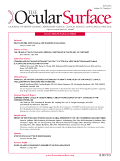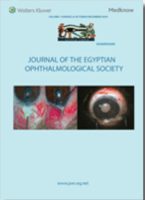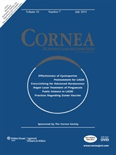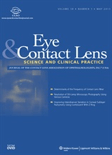
Ocular Surface
Scope & Guideline
Pioneering Discoveries for Visionary Care
Introduction
Aims and Scopes
- Ocular Surface Diseases:
The journal encompasses a wide range of conditions affecting the ocular surface, including dry eye disease, keratitis, and conjunctivitis. Research in this area often investigates pathophysiology, epidemiology, and clinical management. - Innovative Therapeutics:
A significant focus is on the development and evaluation of novel therapeutic strategies, including gene therapy, stem cell therapy, and new pharmacological agents, designed to address ocular surface disorders. - Diagnostic Advances:
The journal highlights advancements in diagnostic techniques, such as imaging technologies (e.g., optical coherence tomography), molecular profiling, and artificial intelligence applications in diagnosing ocular diseases. - Translational Research:
Emphasis on translational research that bridges laboratory findings with clinical applications, aiming to enhance the understanding and treatment of ocular surface diseases. - Multidisciplinary Approaches:
The journal encourages interdisciplinary research involving ophthalmology, immunology, molecular biology, and bioengineering to explore complex ocular surface conditions.
Trending and Emerging
- Artificial Intelligence and Machine Learning:
There is a growing interest in applying AI and machine learning techniques for diagnosing ocular surface diseases, enhancing accuracy and efficiency in clinical settings. - Regenerative Medicine and Stem Cell Therapy:
Research into regenerative approaches, particularly stem cell therapies for ocular surface restoration, is gaining momentum as a promising area of exploration for severe conditions. - Molecular Mechanisms of Disease:
A trend towards understanding the molecular underpinnings of ocular surface diseases is emerging, with studies focusing on cytokines, lipid mediators, and genetic factors influencing pathologies. - Personalized Medicine:
The shift towards personalized approaches in treatment, considering individual patient profiles and specific disease mechanisms, is becoming increasingly prominent in recent research. - Impact of Digital Technology on Ocular Health:
Research exploring the effects of digital screen use on ocular health and dry eye symptoms is on the rise, reflecting contemporary lifestyle challenges faced by patients.
Declining or Waning
- Traditional Pharmacological Treatments:
Research into conventional treatments for dry eye disease, such as cyclosporine and corticosteroids, appears to be waning as novel therapeutic approaches gain traction. - Epidemiological Studies:
The frequency of purely epidemiological studies on ocular surface diseases has decreased, possibly due to an increased focus on molecular and mechanistic investigations. - Basic Science of Ocular Anatomy:
While foundational knowledge is vital, there seems to be a reduced emphasis on basic anatomical studies of the ocular surface, as more targeted and clinical research takes precedence. - Historical Perspectives:
Papers with a historical focus on ocular surface diseases and treatments are less common, indicating a shift towards contemporary issues and cutting-edge research. - General Reviews without Novel Insights:
There is a decline in general review articles that do not present new findings or insights, as the journal shifts to prioritize original research and innovative reviews.
Similar Journals

Ophthalmology Science
Unlocking New Horizons in Eye HealthOphthalmology Science is a premier journal published by Elsevier, dedicated to advancing the field of ophthalmology through innovative research and clinical insights. With an impact factor that positions it in the Q1 category of ophthalmology journals, it stands out as a crucial resource for researchers, clinicians, and students alike. The journal, indexed under ISSN 2666-9145, covers a wide array of topics relevant to eye care, encompassing the latest breakthroughs in diagnostics, therapeutics, and surgical techniques. Operating in the United States from its office in Amsterdam, the journal aims to bridge the gap between laboratory findings and clinical applications, contributing to improved patient outcomes globally. The converged years from 2021 to 2024 reflect its commitment to providing timely and impactful research that shapes the future of ophthalmic practice. Make sure to explore the open access options available for wider dissemination of your work and to stay ahead in the evolving landscape of ophthalmology.

Journal of Ophthalmic & Vision Research
Exploring Innovations in Eye HealthThe Journal of Ophthalmic & Vision Research, published by KNOWLEDGE E, stands as a crucial platform for disseminating high-quality research in the field of ophthalmology. With an ISSN of 2008-2010 and an E-ISSN of 2008-322X, this journal fosters open access to valuable insights since 2010, enhancing visibility and reach for researchers globally. Based in Dubai, UAE, it has established a reputation for excellence, reflected in its Q2 ranking in Ophthalmology for 2023 and its position among the top 65th percentile in Scopus. Covering a broad spectrum of topics within ophthalmic science, the journal serves as a vital resource for professionals, researchers, and students by presenting original research, reviews, and case studies that drive innovation and collaboration within the community. As the journal continues to contribute to advancements in eye care and vision sciences, it invites scholars to explore, engage, and publish within its pages, thus enriching the global discourse on ophthalmic health.

Asia-Pacific Journal of Ophthalmology
Empowering vision science with open access knowledge.Asia-Pacific Journal of Ophthalmology is a distinguished open access journal published by the Asia-Pacific Academy of Ophthalmology (APAO), specializing in the latest advancements and research in ophthalmology. Since its inception in 2013, this journal has established itself as a vital platform for disseminating innovative findings and clinical practices across the Asia-Pacific region and beyond. With an impressive Scopus ranking of #10 out of 137 in the field of Medicine (Ophthalmology), placing it in the 93rd percentile, it garners significant attention and respect within the academic community. Currently holding a Q1 categorization in both Medicine (miscellaneous) and Ophthalmology, the journal embraces a broad scope that encompasses clinical studies, experimental research, and reviews aimed at enhancing the understanding and management of eye health. Its open access model since 2019 ensures that all published works are freely accessible, promoting greater collaboration and knowledge sharing among researchers, clinicians, and students. Situated in the Netherlands with a prominent address in Hong Kong, the journal serves as an essential resource for anyone dedicated to the field of ophthalmology.

GRAEFES ARCHIVE FOR CLINICAL AND EXPERIMENTAL OPHTHALMOLOGY
Advancing the Frontiers of Vision ScienceGRAEFES ARCHIVE FOR CLINICAL AND EXPERIMENTAL OPHTHALMOLOGY, published by Springer, has established itself as a premier journal in the field of ophthalmology since its inception in 1870. With an ISSN of 0721-832X and an E-ISSN of 1435-702X, this esteemed journal enjoys a notable impact in the research community, ranking Q1 in Ophthalmology and Q1 in Sensory Systems, as per the latest 2023 journal category quartiles. GRAEFES Archive is dedicated to advancing our understanding of ocular health through both clinical and experimental studies, making it an essential resource for researchers, practitioners, and students alike. Its comprehensive scope covers various aspects of ophthalmic science, reflecting its long-standing commitment to quality and excellence. Although it currently operates on a subscription basis, the journal's significant Scopus rankings—24th out of 137 in Ophthalmology—underscore its relevance and influence within the scientific community. Situated in Germany, with its address in the United States, this international journal continues to shape the discourse on vision science and therapeutic innovation.

BMC Ophthalmology
Exploring New Frontiers in Eye Health and DiseaseBMC Ophthalmology is a premier open access journal dedicated to advancing the field of ophthalmology through the publication of high-quality, peer-reviewed research. Published by BMC in the United Kingdom, this journal has been a vital resource since its inception in 2001 and continuously contributes to the global dialogue in vision science. With an impact factor reflecting its growing influence, BMC Ophthalmology is ranked among the top quartiles (Q2) in both general medicine and ophthalmology, emphasizing its significance in medical research. The journal encourages submissions that explore innovative diagnostics, treatment approaches, and understandings of various ocular diseases, thereby appealing to researchers, clinicians, and students alike. As an open access platform, it ensures that cutting-edge research is not only published but also readily accessible to a worldwide audience, promoting further study and collaboration in this essential area of medicine.

Journal of the Egyptian Ophthalmological Society
Championing advancements in the science of vision.Journal of the Egyptian Ophthalmological Society is a premier academic journal dedicated to advancing the field of ophthalmology through high-quality peer-reviewed research. Published by Wolters Kluwer Medknow Publications, this journal plays a critical role in disseminating vital findings and innovations in eye care, fostering knowledge exchange among researchers, practitioners, and educators worldwide. Since its transformation to Open Access in 2014, it has significantly enhanced the accessibility of eye health information, thereby broadening its impact on the global scientific community. With an ISSN of 2090-0686 and an E-ISSN of 2314-6648, the journal aims to tackle contemporary issues in ophthalmology, including clinical practices, public health, and technological advancements in eye care. The journal's commitment to excellence ensures that it remains a vital resource for those looking to contribute meaningfully to this dynamic and crucial field.

CORNEA
Transforming knowledge into practice for ocular health.CORNEA is a prestigious peer-reviewed journal published by Lippincott Williams & Wilkins, focusing on the rapidly advancing field of ophthalmology with a particular emphasis on corneal research and diseases. With an impact factor categorized in the prestigious Q1 quartile for its discipline, CORNEA has established itself as a leading platform for the dissemination of both fundamental and clinical studies since its inception in 1982. The journal is ranked 25th out of 137 in the Scopus Medicine-Ophthalmology category, placing it in the 82nd percentile among its peers, which underscores its vital role in influencing ocular research and clinical practices. While the journal is not currently open access, it provides valuable insights and updates for professionals, researchers, and students working to advance knowledge in corneal health, contributing significantly to the ongoing dialogue in the ophthalmological community. With a commitment to excellence, CORNEA continues to publish high-quality research and reviews in its pursuit to improve ocular outcomes and patient care.

JAPANESE JOURNAL OF OPHTHALMOLOGY
Connecting Researchers to the World of Eye HealthJapanese Journal of Ophthalmology, published by Springer Japan KK, is a premier peer-reviewed journal dedicated to advancing the field of ophthalmology. With an impressive impact reflected in its Q1 categories—ranking among the top journals in both Medicine (miscellaneous) and Ophthalmology, as per the 2023 metrics—it serves as an essential platform for researchers and professionals to disseminate their findings. Covering a broad spectrum of topics from clinical studies to innovative technologies in eye care, this journal not only supports the ongoing education of its readership but also fosters significant developments within the field. The journal, which has been in circulation since 1973 and is set to continue through 2024, offers access to vital research, thereby enabling practitioners and scholars to keep abreast of the latest advancements. Its distinguished Scopus ranking of #30 out of 137 in Medicine - Ophthalmology, placing it in the 78th percentile, further underscores its influence and importance in contributing to the global understanding of eye health.

Nepalese Journal of Ophthalmology
Championing Research for Brighter Futures in Eye HealthNepalese Journal of Ophthalmology, established by the NEPAL OPHTHALMIC SOC, is a premier Open Access journal dedicated to advancing the field of ophthalmology. With its ISSN 2072-6805 and E-ISSN 2091-0320, the journal provides an important platform for sharing innovative research and clinical findings in eye health. Since its inception in 2009, the journal has aimed to disseminate high-quality research that addresses contemporary challenges in ophthalmic practices, thus supporting improved patient care and outcomes within Nepal and beyond. The journal has achieved notable recognition, evidenced by its Scopus rank of #267 out of 915 in the field of General Medicine, placing it within the 70th percentile. Researchers, professionals, and students will find valuable information in its comprehensive articles, which cater to a multidisciplinary audience interested in the latest developments in ophthalmology. Emphasizing accessibility, the journal ensures that all published content is freely available, fostering collaboration and knowledge sharing in the global medical community.

Eye & Contact Lens-Science and Clinical Practice
Connecting research and practice for optimal eye health.Eye & Contact Lens-Science and Clinical Practice, published by Lippincott Williams & Wilkins, stands as a premier journal in the fields of ophthalmology and contact lens research. With an ISSN of 1542-2321 and an E-ISSN of 1542-233X, this journal serves as a vital resource for researchers, clinicians, and students dedicated to the study and application of eye care practices. Maintaining a distinguished impact factor within the Q2 category of Medicine and Ophthalmology as of 2023, it ranks impressively at #33 among 137 journals, placing it in the top 76th percentile according to Scopus metrics. Since its inception in 1986, Eye & Contact Lens has consistently delivered cutting-edge research and clinical insights, facilitating advancements in therapeutic techniques for contact lens wear and ocular health. Though not an Open Access journal, it remains accessible through institutional subscriptions, ensuring that essential findings are shared among professionals in the field. The objective of the journal is to present high-quality, peer-reviewed articles that advance the science and practice of eye care, making it an indispensable tool for those seeking to enhance their knowledge and contribute to this dynamic discipline.